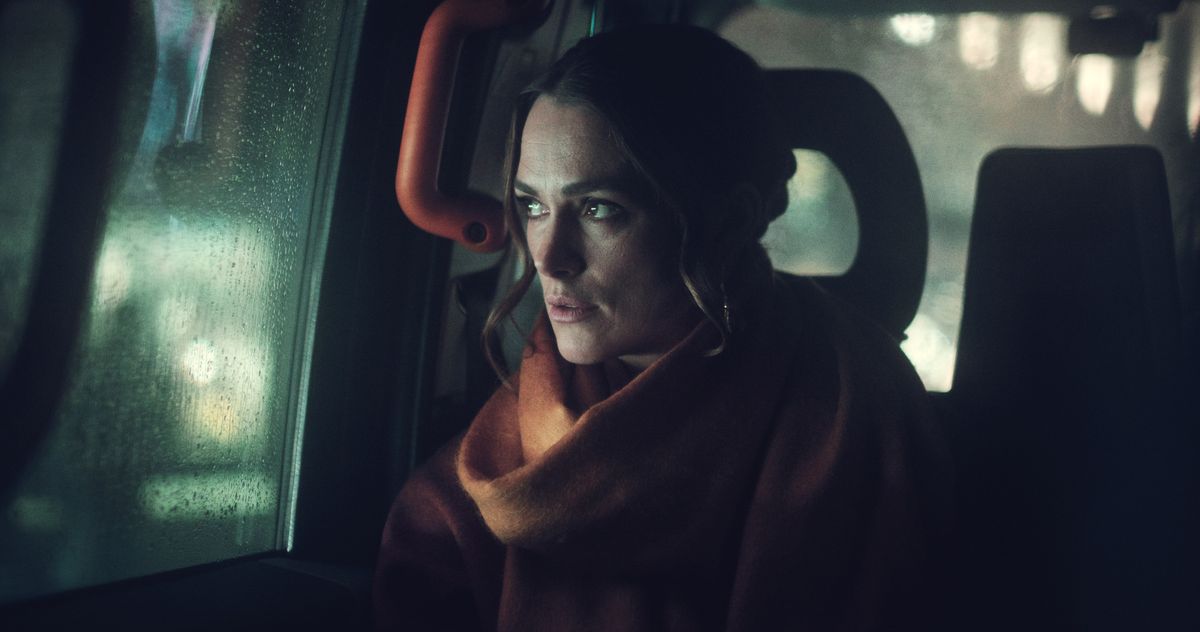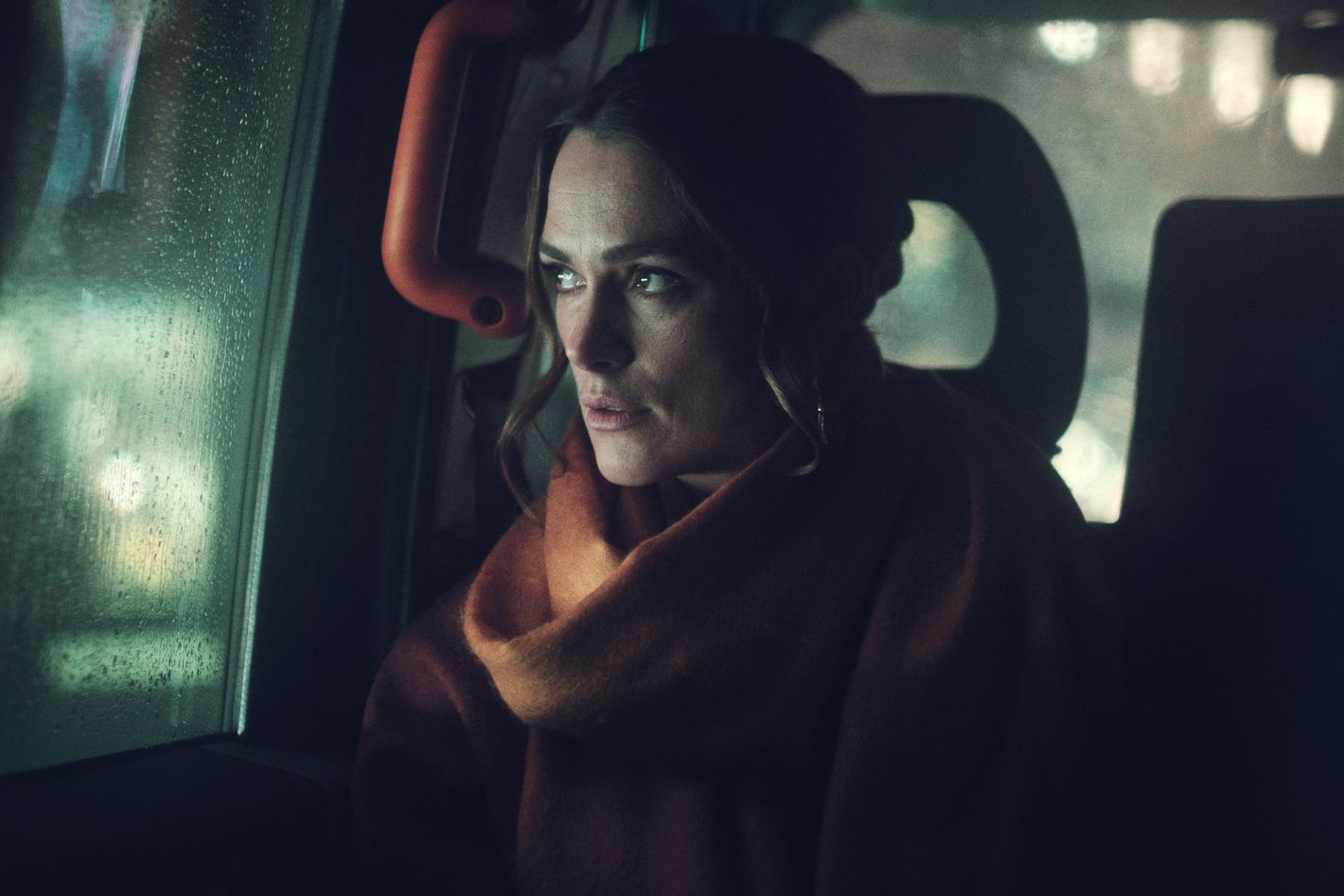Black Doves Season-Premiere Recap: Hello, Darling
Keira Knightley stars in Netflix’s answer to Slow Horses, and it makes for a fun, fizzy holiday mystery.


Welcome to Black Doves, where the currently-reigning queen of portraying independent-minded women of history (Keira Knightley) and the voice of ultra-gentle and genteel Paddington Bear (Ben Whishaw) play Helen, a political wife who’s also quite the dab hand at knife work, and her friend Sam, an assassin who’s come out of shame-riddled retirement for one last job protecting Helen. The fast-paced, expectation-subverting series — in a category I shorthand as Banter & Bullets — was renewed for a second season before its premiere on Netflix, so feel free to get invested in these characters and their attempts to stay alive long enough to exact vengeance against London’s worst, shadowiest bad guys.
We should be in for a fun and substantive ride, not least because of how deftly the scene is set in London right before Christmas. Many series and films about various underworlds argue that every place is really two places at once: the place it appears to be publicly and the chaotically violent place roiling underneath the surface. For London alone, that’s the basis of Guy Ritchie’s entire career, is the premise and engine of AMC+’s Gangs of London, and most significantly for this series, underpins creator and showrunner Joe Barton’s criminally under-watched noirish, romantic family melodrama Giri/Haji.
The series premiere sets about its job of introducing us to our (anti?)heroes and their handler, Reed (Sarah Lancashire, a welcome sight every time she’s on-screen), and to the stakes, which span the chasm between deeply personal and world-destabilizing. The opening episode manages these tasks with a briskness that prevents the exposition from slowing the episode down or from dulling its impact. Choosing the most wonderful time of the year as the timeframe is clever and purposeful, too: for every twinkly Christmas tree and festive gathering, there’s a tawdry, dangerous scheme unfolding somewhere close by.
Right out of the gate, Black Doves also poses a bunch of questions about the lives of assassins and spies: can they still be professionally successful in middle age, or is this intensive fieldwork fundamentally a young person’s game? It’s a cruel joke that criminals drawn to clandestine, often amoral work must be inquisitive, curious, and thoughtful to thrive in and survive their high-stakes profession, and, due to those exact qualities, are also likely to experience existential crises along the way.
When we meet her, Helen (Knightley) has put in ten years of solid undercover work as a Black Dove. Her husband, Wallace Webb (Broadchurch’s Andrew Buchan), has enjoyed a rapid ascent in the Conservative Party and is now Defence Secretary, which has caused Helen’s stock to rise, too. She’s an exemplary agent, particularly on the soft power and cover-preserving aspects of the role, managing her family’s social life with ease and style — we see her listening sympathetically to Wallace’s concerns about the suspicious death of the Chinese ambassador, then bundling him and their elementary school-aged twins Jacqueline and Oli into a cab to attend their annual Christmas party/charitable fundraiser — but Reed has perceived cracks in Helen’s veneer of sunny capability.
Protective of her agent and even more protective of the revenue Helen’s intel has provided their mysterious and state-agnostic organization over the past decade, Reed has been having Helen watched over the last few weeks. She knows Helen has been meeting often, and at odd hours, with a handsome, young, and now dead Justice Department civil servant named Jason Davies.
She also knows that before Helen had lunch with Jason the previous day, Jason had met with jewelry shop assistant Maggie Jones and tabloid journalist Phillip Bray, and now both of them are dead, too. Their deaths — by slit throat, strangulation, and sniper’s bullet, respectively — are clearly murders, but London’s Metropolitan Police haven’t connected the dots among the three of them just yet. The Met has ruled Ambassador Jun Chen’s death a heroin overdose, but his colleagues are very skeptical. As an unwelcome bonus complication, Mr. Chen died at his socialite daughter Kai-Ming Chen’s apartment, and she’s nowhere to be found.
Ordinarily, this situation would be a prime hay-into-gold opportunity for the Black Doves, whose loyalty is always to their financial bottom line and always sell to the highest bidder. Helen’s connections to Whitehall and Number 10 are perennially valuable, and at this moment in particular, they could provide a bonanza of insight and competitive advantage for the winner of her intel.
Unfortunately, Helen isn’t anywhere close to her best at the moment. Without anyone but the unsympathetic and (not unreasonably) angry Reed to confide her grief in, Helen channels it into doing everything Reed warned her against when she broke the news of Jason’s murder. Do nothing? Helen goes to Jason’s flat, where her near-meditative rummaging through his belongings is interrupted by two assassins in costume as police officers. She fends them off — with surprising aplomb and skilled knife work — as long as she can until veteran triggerman Sam arrives to bail her out. Attract no attention? The assassins, Williams and Kent, shoot Jason’s landlady dead at her front door, and when Sam shows up, he’s got both quips and a shotgun at the ready, killing Kent and sending Williams scurrying away into the night before issuing a flawlessly posh “hello, darling.” They manage to escape with both their lives and a hard drive Jason had secreted in an air vent, but leaving fingerprints, two bodies, and an awful mess in their wake is not anyone’s idea of keeping a low profile.
It turns out that Sam and Helen have a long, successful history as a team, and although they’re not making the best use of their rapport so far, things look promising. They squabble affectionately and are very glad to see each other, quickly establishing that Sam is in town at Reed’s behest to protect Helen, not “to retire” her. However reluctant Sam was to come back to London from his self-imposed exile in Rome, dragooning him was a very wise and borderline-kind move on Reed’s part. Helen is the only person Sam would do this for, and as Reed reminds him, he owes Helen. The precise nature of the debt is unclear for now, but it must be a doozy.
One thing we learn that these two have in common (and which sets them apart from Reed and others of her ilk) is deep romanticism, a very dangerous quality in their lines of work. It emerges as a major source of Sam’s melancholy when he attends a quiet dinner with his long-ghosted civilian friends Arnie and Zack: it’s been seven years since he fled London without a word to them, but they still love him, and bring him up to speed about his ex-boyfriend Michael, who has moved on with his life and is now a father, via surrogacy. For her part, Helen almost proudly tells Reed that her liaison with the doomed Jason wasn’t part of a job; it was love, and isn’t that the worst thing Reed’s ever heard? Helen approached him on her own initiative, and based on flashbacks of their time together, it looks like the space they carved out together was the one thing that was entirely hers. She adores her children, and there seems to be real love and chemistry between Wallace and her, too, but she can’t escape the knowledge that her entire family life only exists because of her job. Absent the operation that’s become a lifelong assignment, who even is she, and what is she doing there?
As The Americans reminded viewers in nearly every episode, long-term survival in all-encompassing assignments like Helen’s demands a functional partnership rooted in some measure of trust. Having each other to rely on and confide in was crucial to Philip and Elizabeth Jennings’s nearly 25 years in service to the KGB’s Directorate X. Helen’s been toiling away, wearing a near-permanent mask as a political wife almost entirely on her own for the last seven years. Sam was the person with whom she’d been most herself, and then, eventually and fleetingly, so was Jason.
Reed, by contrast, isn’t just management, and for all her sternness, she really does care about her unruly charges. Even as Lancashire’s performance invites comparisons with other steely women who excel at spy-handling (see also: Dame Judi Dench as M in three of the last four Bond films and Margo Martindale as Claudia in the aforementioned The Americans), she’s creating little pockets of idiosyncrasy. One of her preferred meet-up sites with Helen is a movie theatre, where she rather pointedly chooses a screening of Brief Encounter (a British classic about strangers who secretly embark on an ill-advised affair after a chance meeting) for their rendezvous. Her clothing is all unmemorable shades of beige, gray, and cream, but her daintily white hair is cut into a bob that suggests a Tudor-era gable hood or a nun’s veil.
Before showing up at Arnie and Zack’s home for dinner, Sam swings by a guitar shop/arms cache run by a grizzled veteran, Bingo (played by Rat Scabies of The Damned!), and takes a few investigative steps into Jason’s murder that turn up a bullet casing from the sniper’s likely perch. He’s a little rusty — getting spotted by Arnie just outside the illicit armory was clumsy and could have been very dangerous to them both — but it seems like he’s throwing himself fully into his assignment, and that counts for something. Sure, he’s several glasses of wine and a line of cocaine into the evening when he receives intel on Jason’s shooter, but he’s still enough of a professional to shift into business mode, heading back into the night to pick Helen up at home.
Closing Doors, Opening Windows
• Quartermaster Bingo is just one of a bunch of moments and briefly-appearing characters that give Black Doves’s world more texture than it requires, showing us that series creator Joe Barton and his writers’ room are enthusiastic scholars of their genre. Bingo and his shop remind me of the scenes featuring the tailor and sommelier in the John Wick films. Sam’s forensics contact, a deeply strange makeup counter worker at — where else? — high-end department store Liberty, could fit in that category, too, though she also seems like she stepped out of a scene as an extra in one of the Matrix films.
• Giri/Haji, Joe Barton’s previous series, is set in both Japan and England, is formally playful, and stars Kelly MacDonald, Will Sharpe, Takehiro Hira, and Anna Sawai. If you fall for Black Doves and have enjoyed so much as a single scene of Shōgun or Pachinko, watch Giri/Haji next.
• The Christmas setting also cocoons every evening scene (and there’s no shortage of them!) in moody, atmospheric red and green lighting. It’s festive, it’s mulled wine, it’s spilled blood, it’s money, it’s queasiness, it’s mysterious, it’s garish. I love it.








